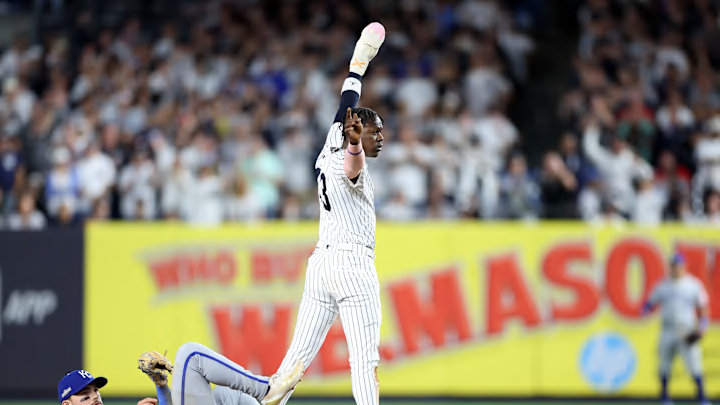The Yankees are heading to Kansas City tied 1-1 after splitting the first two games of the ALDS in the Bronx. Game 1 was a thrilling back-and-forth affair that saw five lead changes, and Game 2 was a bit of a snooze fest, with the Royals scoring all of their runs in the fourth inning and the Yankees failing to mount a serious comeback.
One common thread between the first two games of the ALDS has been the Yankees' inability to hit in the clutch; they are a combined 3-for-19 with runners in scoring position, and their lack of aggression on the base paths hasn't helped. Aaron Boone and Brian Cashman might be able to attribute their performance with RISP to variance and a small sample size of 19 at-bats, but the lack of stolen base attempts is part of the Yankees' identity.
It makes sense, given the Yankees led the majors in home runs this season, that they would not want to get thrown out too often stealing bases, but in a short best-of-five series, they don’t have the luxury of a long season to weather these moments of offensive ineptitude. They have to push their advantages, whatever they may be, even if it goes against the team's general philosophy, and one of the edges they have is the opportunity to run against Salvador Pérez. Pérez used to be one of the best defensive catchers in baseball, but now the Royals platoon him with Freddy Fermin for defensive purposes. Using a platoon in the ALDS would mean losing either Yuli Gurriel, Vinnie Pasquantino, or Pérez from the line-up. In other words, Pérez is sticking at Catcher.
Salvador Pérez is a weak spot behind the plate for KC Royals in ALDS
How bad is he? According to Statcast, he's got fifth percentile arm strength and 17th percentile pop time; he threw out only 11 of 48 base runners this season, which is middle of the pack. Sure, it's not like he's Jonah Heim out there, but by running more, the Yankees would split Royal pitchers' focus between making a good pitch and preventing the runner from getting a good lead.
They don't need to turn into the Nationals (who led the majors in steals), but the Royals should at least be afraid that the Yankees might steal. That could lead to mistake pitches, where Yankees hitters will ideally capitalize with base hits. It would also help them stay out of double plays and put more runners in scoring position if they are successful in their attempts. It could be the spark they need to improve their average with RISP.
Aggressiveness on the basepaths has already had a significant impact on the series. In Game 1, Jazz Chisholm Jr. stole second base to set up the winning run. In the fourth inning of Game 2, the Royals had three runners take an extra base during the inning, and all three came around to score. The Yankees need to learn from what's happened to avoid an embarrassing loss at the hands of the upstart Royals.
More Historical Content From Call to the Pen:
